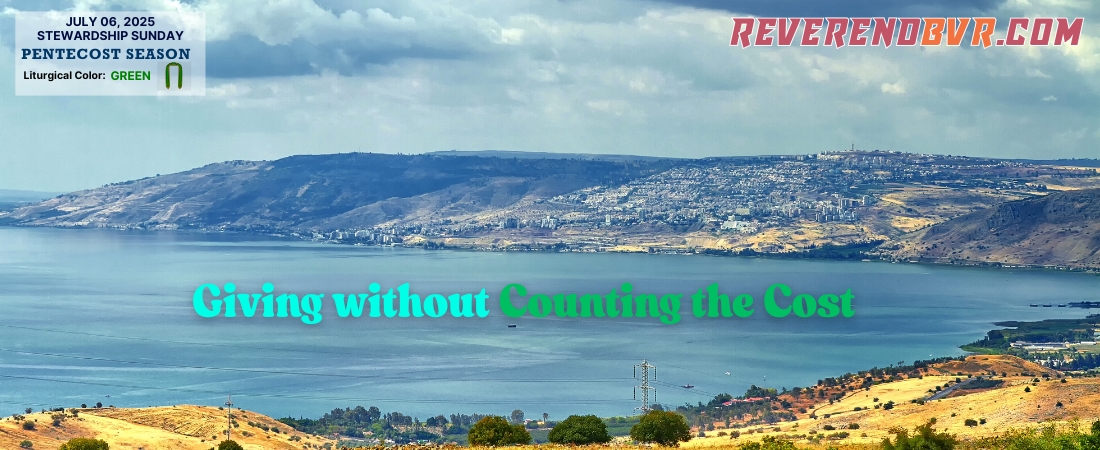On Stewardship Sunday, this sermon invites us into the divine paradox of Christian generosity—giving without counting the cost—as modeled by Abraham, the psalmist, the Macedonian believers, and the woman with the alabaster jar. Rooted in grace (χάρις) and covenantal justice (צְדָקָה), it challenges us to become living channels of God’s boundless generosity rather than stagnant reservoirs of self-preservation.
Sermon Title: Giving without Counting the Cost.
Occasion: Stewardship Sunday | July 06, 2025, Sunday.
Textual Foundations: Genesis 13:8–18; Psalm – 15; 2 Corinthians 8:1–15; Mark 14:3–11.
Website: www.reverendbvr.com
Introduction: The Costless Cost of Christian Giving
In a world where everything is measured—currency, time, energy, and even affection—Christian giving presents a paradox: to give without counting the cost. This is not a reckless, transactional generosity but one that is rooted in God’s own economy of grace. The scriptural narratives, from Abraham’s selfless generosity to Paul’s commendation of the Macedonian church, call us to emulate divine generosity that does not tally or limit.
To give without counting the cost is to reflect God’s grace—χάρις (charis)—freely bestowed and freely extended. Let us explore this theme through four lenses: the Patriarchal narrative, Psalmic character, Pauline theology, and the Gospel act of devotion.
1. Abraham and the Choice of Selfless Generosity (Genesis 13:8–18) Exegesis and Theological Reflection :
In this pivotal scene, Abram generously offers Lot the first choice of land, despite being the elder and rightful leader of their tribe. His words in Hebrew—“הֲלֹא כָל־הָאָרֶץ לְפָנֶיךָ” (“Is not the whole land before you?” v.9)—convey not only openness but surrender. Lot chooses the fertile Jordan plain, motivated by visible prosperity, unaware of the spiritual peril of Sodom.
| S. No | Abram’s Giving | Lot’s Taking |
| 1 | Selfless and relationally motivated | Self-serving and materially motivated |
| 2 | Leads to divine reaffirmation of blessing (vv.14–17) | Leads to moral and spiritual entanglement (v.13) |
Abram gave without calculation, and paradoxically, received even more from God. This anticipates Jesus’ teaching in Luke 6:38: “Give, and it will be given to you…”
2. The Character of Costless Giving (Psalm 15)
Psalm 15 outlines the character of one who dwells on God’s holy hill (הַר־קָדְשֶׁךָ). Among the virtues listed is the person who “lends money to the poor without interest” (v.5)—a direct reference to the Torah’s ethic of communal equity (cf. Exodus 22:25; Leviticus 25:36–37).
The Hebrew expression “לֹא־יִתֵּן בְּנֶשֶׁךְ” (does not lend with interest) is more than economics—it is covenantal compassion. The righteous person gives not because of potential return, but because of God’s righteousness (צְדָקָה, tsedaqah) flowing through them.
Spiritual Character Traits of the Giver in Psalm 15:
| S. No | Virtue | Hebrew Root | Implication for Giving |
| 1 | Blameless walk | תָּמִים (tamim) | Integrity in motive |
| 2 | Speaks truth | אֱמֶת (emet) | No hidden agenda |
| 3 | Keeps an oath at personal cost | לֹא יָמִיר | Faithful giving even in discomfort |
| 4 | Lends without interest | נֶשֶׁךְ (neshekh) | No exploitation in giving |
3. The Macedonian Model of Grace Giving (2 Corinthians 8:1–15) :
Paul’s commendation of the Macedonian churches is perhaps the New Testament’s most eloquent exposition on giving. Despite “extreme poverty” (βαθεῖα πτωχεία, v.2), their “rich generosity” (πλοῦτος τῆς ἁπλότητος) overflowed.
“They gave themselves first of all to the Lord…” (v.5)
Giving, in Paul’s vision, is not merely transactional—it is relational and transformational. The grace of giving (χάρις τῆς διακονίας, v.6) is a ministry (διακονία) rooted in love and equality (vv.13–15), echoing the manna principle from Exodus 16: “He who gathered much had nothing left over, and he who gathered little had no lack.”
Principles of Grace-Based Giving from 2 Corinthians 8 :
| S. No | Principle | Greek Term | Meaning |
| 1 | Giving beyond means | καθ᾽ ὑπερβολὴν | Overflowing, excessive |
| 2 | Eagerness to give | παρακαλοῦντες | Urgent desire |
| 3 | Sincerity of love | γνησιότης τῆς ἀγάπης | Authentic love verified by action |
| 4 | Equality as a goal | ἰσότης | Economic and spiritual reciprocity |
4. The Costly Beauty of Devotion (Mark 14:3–11) :
A woman, unnamed in Mark but identified as Mary in John 12, breaks an alabaster jar and pours out nard (νάρδου πιστικῆς πολυτελοῦς)—a perfume worth over 300 denarii (a year’s wages). This act provokes indignant criticism: “Why this waste?”
Jesus responds with theological clarity: “She has done a beautiful thing to me” (καλὸν ἔργον). The extravagance of her gift is not condemned but memorialized (v.9). Her action embodies sacrificial, prophetic, and incarnational giving—she gives herself and anticipates Christ’s burial.
| S. No | The Woman’s Giving | Judas’ Reaction |
| 1 | Extravagant love | Monetary calculation |
| 2 | Honors Jesus | Prepares betrayal |
| 3 | Eternal memorial | Temporal gain |
5. Theological Interlude: Divine Economics
Scripture does not measure giving in terms of amount, but intent, sacrifice, and trust. Isaiah 55:1 speaks of God’s kingdom economy: “Come, buy wine and milk without money and without cost.” This echoes the gratuitous nature of grace—given freely (Matthew 10:8), received without merit (1 Corinthians 4:7).
Illustration: The Sea of Galilee vs. the Dead Sea
| S. No | Sea of Galilee | Dead Sea |
| 1 | Receives and gives | Receives only |
| 2 | Full of life | Barren and dead |
| 3 | Symbol of generosity | Symbol of selfish stagnation |
We are meant to be like the Sea of Galilee: channels, not reservoirs. In giving, we remain alive—spiritually, emotionally, and communally.
6. Conclusion: The Full Circuit of Grace
To give without counting the cost is not to ignore prudence, but to exceed it with love. Christian giving is a eucharistic act—an offering of thanks that reflects divine generosity. Abram, the Psalmist, the Macedonians, and the woman with the alabaster jar, each remind us: What we keep, we lose; what we give, we eternalize.
7. Prayer
Gracious and Giving God, You who gave Your Son without reserve, teach us to give without counting the cost. May our hearts reflect the open hands of Christ, our actions echo the sacrificial love of the saints, and our lives become rivers of grace to others. Make us like the Sea of Galilee—ever receiving, ever giving, and ever alive. In Jesus’ name, Amen.
Bibliography
- The Holy Bible, New International Version – Genesis 13:8–18; Psalm – 15; 2 Corinthians 8:1–15; Mark 14:3–11.
- Brown, Francis, Driver, S.R., and Briggs, Charles A. Hebrew and English Lexicon of the Old Testament. Oxford: Clarendon Press, 1906.
- Bauer, Walter et al. A Greek-English Lexicon of the New Testament and Other Early Christian Literature, 3rd ed. Chicago: University of Chicago Press, 2000.
- Wright, N.T. Paul and the Faithfulness of God. Minneapolis: Fortress Press, 2013.
- Brueggemann, Walter. Money and Possessions. Interpretation series. Westminster John Knox Press, 2016.
- Barclay, John M.G. Paul and the Gift. Grand Rapids: Eerdmans, 2015.
- Moltmann, Jürgen. The Crucified God. London: SCM Press, 1974.
© 2025 ReverendBVR.com | High-Academic Sermon Series, 2025.
Content licensed under Creative Commons Attribution-NonCommercial-NoDerivatives 4.0 International (CC BY-NC-ND 4.0). You are free to share — copy and redistribute the material in any medium or format with proper attribution. No commercial use or modifications allowed without explicit permission.
For further sermons and biblical reflections, please visit 🌐 www.reverendbvr.com/sermons

